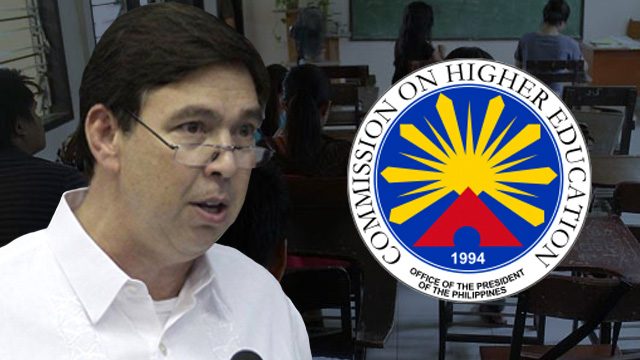SUMMARY
This is AI generated summarization, which may have errors. For context, always refer to the full article.

MANILA, Philippines – Senate Minority Leader Ralph Recto expressed confidence that the tension among high-ranking officials of the Commission on Higher Education (CHED) will not affect the P8.3-billion ($166.26 million) allocation in the 2017 budget for free tuition fees in state universities and colleges (SUCs).
“Kahit walang chairman, may chaiman, o nag-aaway sila, hindi maapektuhan ang programang ito (With or without a chairman, or despite the infighting, this program will not be affected),” he said in a statement Saturday, December 17.
Several CHED officials have called on President Rodrigo Duterte to designate an officer-in-charge to replace CHED Chairperson Patricia Licuanan, but she has refused to resign, citing her fixed term until 2018. (READ: CHED in limbo after Duterte order to Licuanan)
Under the 2017 budget recently approved by both houses of Congress, CHED received an additional P8.3-billion allocation for free tuition in SUCs. CHED still has to iron out the details of the program’s implementation.
In a television interview Friday, December 16, Licuanan admitted that “logistically, it will be a little difficult” to fully implement this program.
“So how do you share, how do you divide up P8.3 billion with 113 SUCs, at kasama na rin daw ang [University of the Philippines] pala doon? What formula do you use? Ang tuition fee ng school times the number of enrollees? So [may] mga challenges like that, but we’re working on it,” she added.
(So how do you share, how do you divide up P8.3 billion with 113 SUCs, and the University of the Philippines, it turns out, is also included? What formula do you use? The tuition fee of the school times the number of enrollees? We have those challenges, but we’re working on it.)
Recto countered on Saturday that CHED would not have to go through the individual records of every student. He further explained how CHED will spend this huge amount.
“This will not be retail spending on their part. All [CHED] has to do is to disburse to the 114 state universities and colleges the amount that their students would have paid for tuition,” Recto said, citing a different number of SUCs from Licuanan’s.
“So the reimbursement is wholesale, so to speak, to 114 entities only. It’s not like they will have to stamp ‘approved’ on every enrollment form,” he added in a mix of English and Filipino.
‘Fact-based advocacy’
According to Recto, the P8.3-billion allocation will be distributed among the SUCs based on the amount of tuition each school is projected to collect next year as reported in a document called Budget of Expenditures and Sources of Financing.
SUCs are expected to earn P7.78 billion ($155.85 million) from tuition fees alone in 2017. Recto said this is the basis of CHED’s additional budget, which is meant to fund only tuition and not other school fees.
The total expected internally-generated income of SUCs in 2017 is pegged at P17.62 billion ($352.96 million).
The minority leader also downplayed fears that President Rodrigo Duterte would veto the allocation for free tuition in SUCs.
He said all presidential candidates in the 2016 elections, including Duterte, promised free tuition in state colleges.
What’s more, he said the tuition-free policy is a “fact-based advocacy.”(READ: Higher budget, free tuition in state colleges: Easier said than done)
“We ran numbers and we saw that at this level of public spending, in this era of trillion-pesos budgets, it’s doable,” Recto said.
Instead of simply writing a provision in the national budget about the tuition-free policy, Recto said Congress included the reimbursement to make sure SUCs will not be “at the losing end.”
It will also guarantee that students from poor farming and fishing families and the urban poor will not have to shell out money for higher education.
Recto thanked Senator Loren Legarda, chair of the Senate committee on finance, for “fighting for this provision.”
“She did a great job. This is a unanimous, bipartisan product. Every senator is an author of this provision,” he added.
Legarda, meanwhile, noted that even if the P8.3-billion allocation covers only tuition fees, indigent students can still avail of grants and aid for miscellaneous fees under different programs, such as the Expanded Students’ Grants in Aid Program for Poverty Alleviation, and the student financial assistance programs of both CHED and the SUCs.
The House of Representatives and the Senate ratified the proposed P3.35-trillion ($67.11 billion) budget for 2017 this week. The 2017 budget is now up for approval by President Rodrigo Duterte. – Rappler.com
*US$1 = P49.92
Add a comment
How does this make you feel?
There are no comments yet. Add your comment to start the conversation.